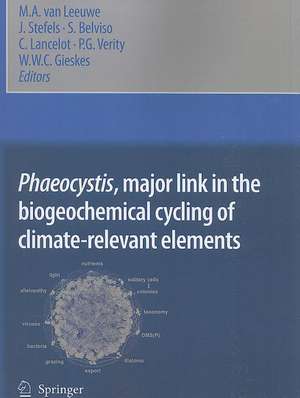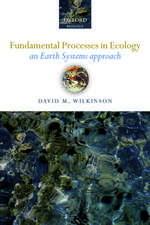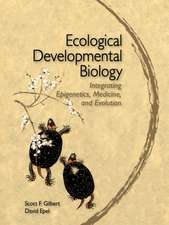Phaeocystis, major link in the biogeochemical cycling of climate-relevant elements
Editat de M.A. van Leeuwe, J. Stefels, S. Belviso, C. Lancelot, P.G. Verity, W.W.C. Gieskesen Limba Engleză Paperback – 9 apr 2011
| Toate formatele și edițiile | Preț | Express |
|---|---|---|
| Paperback (1) | 582.51 lei 38-44 zile | |
| SPRINGER NETHERLANDS – 9 apr 2011 | 582.51 lei 38-44 zile | |
| Hardback (1) | 595.16 lei 38-44 zile | |
| SPRINGER NETHERLANDS – 3 iul 2007 | 595.16 lei 38-44 zile |
Preț: 582.51 lei
Preț vechi: 728.13 lei
-20% Nou
Puncte Express: 874
Preț estimativ în valută:
111.46€ • 121.46$ • 93.92£
111.46€ • 121.46$ • 93.92£
Carte tipărită la comandă
Livrare economică 19-25 aprilie
Preluare comenzi: 021 569.72.76
Specificații
ISBN-13: 9789048175697
ISBN-10: 9048175690
Pagini: 336
Ilustrații: VI, 330 p.
Dimensiuni: 193 x 260 x 18 mm
Greutate: 0.77 kg
Ediția:Softcover reprint of hardcover 1st ed. 2007
Editura: SPRINGER NETHERLANDS
Colecția Springer
Locul publicării:Dordrecht, Netherlands
ISBN-10: 9048175690
Pagini: 336
Ilustrații: VI, 330 p.
Dimensiuni: 193 x 260 x 18 mm
Greutate: 0.77 kg
Ediția:Softcover reprint of hardcover 1st ed. 2007
Editura: SPRINGER NETHERLANDS
Colecția Springer
Locul publicării:Dordrecht, Netherlands
Public țintă
ResearchCuprins
A taxonomic review of the genus Phaeocystis.- Methods used to reveal genetic diversity in the colony-forming prymnesiophytes Phaeocystis antarctica, P. globosa and P. pouchetii—preliminary results.- The life cycle of Phaeocystis: state of knowledge and presumptive role in ecology.- Phaeocystis colony distribution in the North Atlantic Ocean since 1948, and interpretation of long-term changes in the Phaeocystis hotspot in the North Sea.- Photosynthetic responses in Phaeocystis antarctica towards varying light and iron conditions.- Effects of iron concentration on pigment composition in Phaeocystis antarctica grown at low irradiance.- Evidence for high iron requirements of colonial Phaeocystis antarctica at low irradiance.- The carbohydrates of Phaeocystis and their degradation in the microbial food web.- The role of iron in the bacterial degradation of organic matter derived from Phaeocystis antarctica.- The colonization of two Phaeocystis species (Prymnesiophyceae) by pennate diatoms and other protists: a significant contribution to colony biomass.- Zooplankton grazing on Phaeocystis: a quantitative review and future challenges.- The influence of Phaeocystis globosa on microscale spatial patterns of chlorophyll a and bulk-phase seawater viscosity.- Haemolytic activity of live Phaeocystis pouchetii during mesocosm blooms.- Phaeocystis and its interaction with viruses.- Does Phaeocystis spp. contribute significantly to vertical export of organic carbon?.- Vernal sedimentation trends in north Norwegian fjords: temporary anomaly in 234Th particulate fluxes related to Phaeocystis pouchetii proliferation.- Environmental constraints on the production and removal of the climatically active gas dimethylsulphide (DMS) and implications for ecosystem modelling.- Variability inabundance and fluxes of dimethyl sulphide in the Indian Ocean.- Gaining integrated understanding of Phaeocystis spp. (Prymnesiophyceae) through model-driven laboratory and mesocosm studies.- Current understanding of Phaeocystis ecology and biogeochemistry, and perspectives for future research.
Textul de pe ultima copertă
The ubiquitous marine microalgal species Phaeocystis plays an important role in biogeochemical cycles. Phaeocystis has a complicated life cycle, which makes it hard to decipher the role of this organism in ecosystem dynamics and hence its role in elemental cycles. This volume offers a selection of papers that have been presented at the final meeting of Working Group # 120 "Phaeocystis, major link in the biogeochemical cycling of climate-relevant elements", of the Scientific Committee on Oceanic Research (SCOR). The combination of a diverse yet well selected spectrum of scientific disciplines – varying from phylogeny to microbiogeochemistry and ecological modeling – makes this a very complete volume; it will no doubt become an important reference to all those working with Phaeocystis. This book comprises important review papers by various top authors in the field. Topics that are addressed reach from the organism level (taxonomy and life cycles) to ecosystem dynamics (interaction with viruses and grazing dynamics). The role of Phaeocystis in carbon cycling is focus of various chapters, as well as its role in sulphur cycling. The last treatise of this volume comprises a synthesis of all the presentations of the meeting. This chapter highlights the most relevant insights that have been gained so far and defines urgent questions that need to be addressed in future research.
Caracteristici
High quality papers by leading authors Complete coverage of topics (including review papers and new science) Topics of broad geoscience relevance Up-to-date knowledge

















